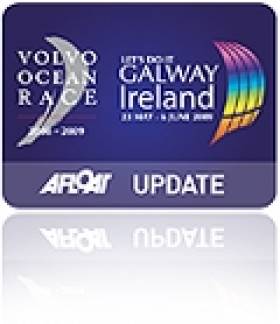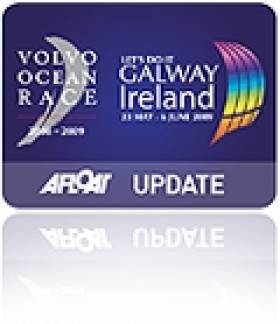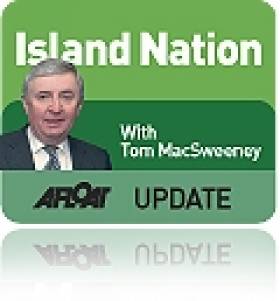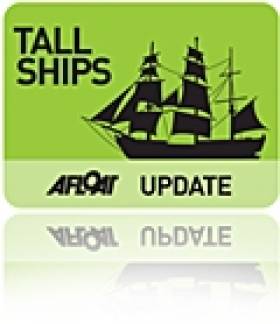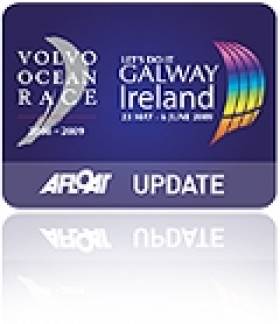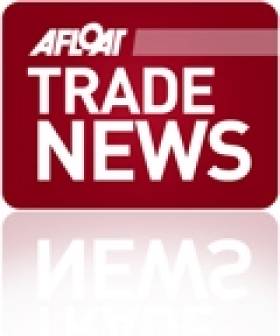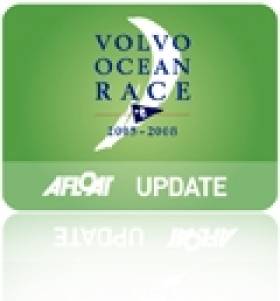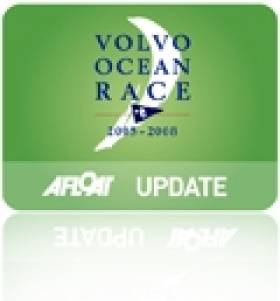Displaying items by tag: Green Dragon
Irish Sailors Get Ready for First VOR In-Port Races
The first of the in-port races ahead of the Volvo Ocean Race start tomorrow in Alicante – and top Irish sailors are among the six teams competing.
Wexford’s Justin Slattery is on Abu Dhabi Ocean Racing, which is competing in the race for the first time.
Skipper Ian Walker told Sail World: "Everything is ready and we can’t wait to line up against the other teams... The forecast is for strong breeze on Saturday so there will be extra pressure on the crew to get it right."
The team has another Ireland connection in its commercial director David Hassett, a veteran of the Irish yachting scene and backer of Ireland's Green Dragon team in the 2009 race.
Elsewhere, Kerryman Damian Foxall is a watch leader on Groupama, captained by debuting VOR skipper Franck Cammas - who last month received one of France's most prestigious sporting honours.
Meanwhile, the Chinese entry Team Sanya, which is part sponsored by Discover Ireland, is hoping skipper Mike Sanderson - who took Telefónica Blue to the podium at every stage in the 2009-09 race - can repeat his past successes.
In-port races take place in all 10 host ports along the 39,000-nautical-mile route, and as they account for more than 20% of the points, no team will be taking them easy.
As previously reported on Afloat.ie, a delegation from Galway - hosts of the final stage of the race next summer - will be in Spain for a week of events beginning tomorrow ahead of the start of the race proper on 5 November.
Sail World has more on the story HERE.
Green Dragon Sails Again
Ireland's Volvo 70 the Green Dragon was back on the water again yesterday, two years after she had finished fifth out of seven entries in the 2009 Volvo Ocean Race.
Attempts to sell it for two million euros in 2009 did not materialise. Since then, the round the world yacht has been in dry dock in Galway, rendered obsolete because her hull was heavier and keel lighter than her rivals.
In spite of the disappointing performance the boat was welcomed in to Galway after the 2009 Transatlantic leg by a huge crowd and a week long celebration that has subsequently set the bar for all other stop over ports in the 2012 race.
After being refitted and repaired recently, the Green Dragon sailed out of Galway Docks yesterday for a tour of the bay, before she sets sail for Holland tomorrow.
Ireland's entry in the 2008-9 Volvo entry race will be taking part in the Frankfurt Motor Show promoting the Volvo Ocean Race 2012 and the Global Village in Galway where the race will end next July.
Speaking to Galway Bay FM News, Green Dragon Chairman of Let's Do it Global Enda O'Coineen says 'the sail went great'.
Cheeky Chinese Challenge?
This is an interesting challenge to the present US holders, computer software billionaire Larry Ellison's Oracle Racing team which decided to have the event hosted by the San Francisco Yacht Club, which prides itself as being "the oldest club West of the Mississippi in North America."
It will be the first time the America's Cup has been hosted in the United States since 1995 and it is interesting to speculate whether the Chinese are cheekily challenging the Americans who don't like the Cup going outside of the States.
Racing will be held on the iconic San Francisco City front and be visible from world-renowned tourist destinations such as the Golden Gate Bridge.
"My support for San Francisco hosting the America's Cup goes beyond the opportunity to see our team competing on home waters," said Russell Coutts, CEO, ORACLE Racing. "We are excited to sail for our sport's greatest trophy, on a stretch of water legendary among sailors worldwide."
The China Team has been given the backing of the Chinese Government and has already been designing a boat for the 34th Cup event which will be raced in 72-foot wing-powered catamaran multihulls.
"We have been working with some of the best worldwide designers for hulls and wings for a few months in partnership with top Chinese universities," the Team Leader, Wang Chao Yong, said. "This is an opportunity to showcase Chinese talents at the leading edge in hi-tech areas of both hydrodynamics and aeronautics. Our boat will be built in China."
The Chinese made an unsuccessful attempt on the 2007 America's Cup. While the intention is that most of the sailors on their America's Cup team will be Chinese there is to be, as in the 2007 attempt, a French influence. Thierry Barto has been appointed Chief Executive Officer and given the task of getting top sailors to coach the Chinese team.
It seemed initially that interest might be lacking in the 162-year-old event. However ten teams have signed up to take part in the 34th America's Cup.
Aside from the defender, Oracle, entries include Team New Zealand, Italian syndicate Mascalzone Latino - the official challenger of record - and Artemis of Sweden. Two French teams and the Chinese have also paid their entry fees. America's Cup Racing Management says two other unidentified teams, one of which is believed to be Italy's Venezia Challenge, will take part. Whether all of the existing entries make it to the start line of the challenger elimination series in July of 2013 will be interesting. There was major legal action before the event was re-scheduled for 2013. Oracle and Ellison declared their preference for a defence in San Francisco as the "home club".
Two of the three possible French challengers had talks with the Minister for Sport in Paris last Friday to discuss amalgamation and whether there would be French government support. There is also an "Argo Challenge" from a group of disabled sailors.
• This article is reprinted by permission of the EVENING ECHO newspaper, Cork, where Tom MacSweeney writes maritime columns twice weekly. Evening Echo website: www.eecho.ie
Tall Order for Ireland
Sailing in Ireland could yet have a tall ship to replace the Asgard II and the Lord Rank. A meeting in Dublin in late March represents a major step forward in the process to put an Irish tall ship back on the high seas.
The open workshop, to be held on March 26th, will be facilitated by Dublin Port, and will include state interests, tourism interests, commercial port interests, youth organisations, maritime organisations and education groups, together with the former Lord Rank and Asgard II operators.
The catalyst for the initiative is a 'reference group' which represents a broad cross-section of interests, both North and South. Operating under the chairmanship of Lord Glentoran, and supported by Dr Gerard O'Hare, David Beattie and Enda O'Coineen, the group has also engaged a professional consulting firm to move the process along.
The initial focus is on the necessary organisation and rationale behind building a new vessel, while scientifically quantifying the benefits to build a plan and justification.
The view taken is that, while there may be no money available at this time, there is no excuse for not having a plan and the idea is to create ' joined-up' thinking. And while the government in the South placed the insurance money paid out on Asgard II back into general exchequer funds, the insurance payment on the Lord Rank was kept and ' ring-fenced' for this new initiative.
To date, there have been several meetings of the reference group. The planned workshop on the subject at Dublin Port March 26 is open and interested parties are invited to contribute. It will also bring together for the first time the leaders of Tallships in Dublin, Belfast, Waterford and Cork.
Ultimately Tall Ships is about youth training and development; without an active Tall Ship, it will be very difficult for Ireland to attract Tall Ship events. The new reference group will work to support the new Sail Training Ireland Association initiative, and link in with Sail Training International which runs Tall Ship events.
Following the Dublin workshop, Belfast Harbour Commissioners will host a working meeting of the group in early May to finalise a plan, present to stakeholders and create a roadmap forward.
"In addition to youth training, a working Tall Ship forms a brilliant ambassadorial role promoting tourism, enterprise and commercial interests," said Lord Glentoran. "It is something that we can all relate to and it has universal acceptance for youth training on an island of Ireland basis." Lord Glentoran has a long commitment to youth sail training and was Chairman of the organising committee that brought the Tall Ships to Belfast in 1991.
The reference group is seeking to engage with as many stakeholders as possible, and has pledged that the new vessel will be owned by the community in Ireland and the Irish Diaspora. The initial view is that the project clearly needs to be linked with the institutions of State - North and South - as are universities state agencies and ports, while at the same time having a strong private support network making for a mix of public and private funding, "We now have a brilliant opportunity to look around the world, establish best practice in the best kind of vessel, how to fund it and to quantify the benefits for each of the stakeholder group," said Enda O'Coineen, who has been instrumental in bringing the group together. In addition to being a former Coiste and Asgard Director, he is the founding Chairman of Let's Do It Global, which brought the Volvo Ocean Race to Galway and successfully raced the Green Dragon around the world.
O'Coineen added that a "world class solution" can be created and that its benefits can be financially quantified, which would allow supporters to make a compelling business case to divert and use existing funds in Tourism, Enterprise and Youth Training. "While there is no money available now to support the scale and professionalism needed, this is not an excuse not to have a plan and a vision," he added.
Since the loss of the Asgard II and Lord Rank, Ireland has been left with no sail training opportunities for young people and likewise for maritime development, enterprise and tourism. If nothing is done, future generations will suffer. The reference group believes that the solution is the construction of an Ireland - North and South - training vessel, fulfilling several roles with a common mission and resourced according to quantifiable benefits delivered to stakeholders. It is also open to the use of an existing vessel - a key component being suitability and the operations budget.
The proposed Tall Ship project will enhance skills and opportunities for young people across the island, regardless of background, class or education. It could be used to showcase Ireland as a brand at overseas events and it could also host international students who wish to come to the island of Ireland, as is the case with many of the International Tall Ships Programmes already running on a global scale which create a huge amount of tourism for their respective countries.
The reference group notes that the Tall Ships concept appeals to young and old alike as the romanticism behind the concept touches on history, social studies, legacy, family, travel, adventure and, most importantly, fun. Tall Ships allow people to dream. They do however have an underlying seriousness and the concept is grounded in methodology that has been tested and proven the world over.
An advertisement in March/April of Afloat magazine - out now - gives full detials of the 'Tall Ship for Ireland' Workshop
Should Ireland be represented at the Tall Ships Races at Waterford 2011 and Dublin 2012? We want your vote on our Facebook Poll HERE.
Looking for further reading on Tall Ships in Ireland? Click the links below:
Click this link to read all our Tall Ships Stories on one handy page
Previewing Ireland's Tall Ships 2011 Season
Funding Remains Big Issue for Irish VOR Bid
After a struggle to complete the course both financially and on the water in the last Volvo Ocean Race two years ago, Green Dragon is to set sail again if the money can be found to fund a campaign. In this morning's Irish Times David Branigan indicates a potential skipper, Matt Humphries, has been advising the Galway based team but the real problem, as it always has been for the Irish boat, is finding the funding (ten million) to start the race in Spain next year. Full article HERE.
Galway Sailmaker Teams up with Hyde Sails
Hyde Sails has announced the appointment of a new loft in Galway.
The only sailmakers on Ireland's west coast, Cullen Sailmakers was established in Galway in 1984. Since then Glendy Cullen (pictured below) has established a reputation for his loft's expertise and friendly service, manufacturing and repairing sails for both modern designs as well as the more traditional side, such as the Connemara and Galway Hooker gaff rig boats.
As the business grew, it moved to new and larger premises in Ballybane Industrial Estate. Glendy Cullen explains: "This move has facilitated our expansion and allows us to operate on a more professional and customer friendly basis. The central location of this sail loft has also proved hugely beneficial as it is easily accessible from all parts of the city and county."
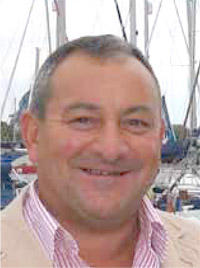
The tie-up with Hyde was the next logical step, enabling the loft to offer an even more comprehensive service. 'I like Hyde's sails and the quality of workmanship is very high, ' explains Glendy. "We wanted a partner to help us to increase our production resources to enable us to meeting the ever-growing demand for our services, without compromising on quality."
Shore crew sailmaker for the Volvo Ocean Race Irish Green Dragon team, Glendy worked closely with the sailors and their onboard sailmaker during the last stopover.
Hyde's Sales and Marketing Director Richard Franks commented: "We see this as a big step for the Hyde brand in Ireland. In Glendy we have a strong local sailmaker who is already offering a fantastic level of service. The partnership brings together the strength of the Hyde brand and our state of the art production facilities, and a local, hand-on loft with the skills to service the Irish market locally at a time when Galway is expanding rapidly as a sailing area. It gives us great pleasure to welcome Glendy and his team to the Hyde family.'
Green Dragon Attracts New Sponsors
Green Dragon's Walker Signs for Abu Dhabi for 2011 Race
Appointed by the team's backer, Abu Dhabi Tourism Authority (ADTA), Walker, who steered Green Dragon from Galway two years ago, will lead an 11-strong crew hoping to stake its claim in one of the world's toughest, most extreme sporting challenges.
There is still no further news about how Ireland's entry for the race is shaping up or if work to bring the Green Dragon yacht up to speed has started.
ADTA, which was behind the emirate's successful bid to become a Volvo Ocean Race 2011-12 host city, believes Walker's appointment is a major coup for Abu Dhabi's inaugural title tilt.
"Ian is the lynchpin in the dream team we are determined to secure," explained Ahmed Hussein, Deputy Director General, ADTA. "His high profile sends a signal of the seriousness of our ambitions in a sport which will help us build international awareness of our long maritime pedigree and exceptional coastline and surrounding waters."
As design consultant on ADTA's planned, specially designed Volvo Open 70, Walker will be out to capitalise on years of experience to guide the outfit through nine-months of intense, head-to-head sailing over 39,000 nautical miles comprising four of the world's most treacherous oceans.
"The Volvo Ocean Race is mentally and physically exhausting. The whole project is quite daunting, but it is easier to comprehend having done the race before. I have huge respect for the yachts and the race and we will be as prepared as we possibly can be," said Walker, one of the world's leading helmsmen and tacticians.
"This is a fantastic opportunity to build a winning team both on and off the water. It is a huge challenge, yet we are confident we will compete for top honours. We have a unique opportunity to do something special with Abu Dhabi Ocean Racing.
"The emirate's participation is a huge step forward for sailing. Abu Dhabi is a great venue and the conditions are perfect for a sailing destination. This will certainly encourage other sailing events and championships to come to this part of the world and is already inspiring the local population to get fully behind sailing. The entire emirate, including nationals, is eager to embrace the race and get behind its team. This is going to be a fantastic journey."
ADTA and Walker, who lives in Southampton, UK, are also currently in the final stages of appointing the team's other crew members, and are committed to including a UAE national in the sporting team and another two on the shore team.
"I think it is crucial to have the right mix of youth and experience and I also like the idea of an internationally-represented crew. Obviously, you need the right mix of skills such as helming, trimming, bowmen, sailmaking, rigging and engineering, yet it is just as important to select people who will work well as a team. That is what we are aiming for with Abu Dhabi Ocean Racing," said the 40-year-old graduate of Cambridge University – one of the UK's 'Ivy League' institutions.
Knut Frostad, CEO of the Volvo Ocean Race commented, "We are very pleased to have Ian Walker back in our race and believe he will be an excellent skipper and leader for Abu Dhabi Ocean Racing. The host city is an excellent venue for sailing and hopefully this project will encourage and ignite passion for sailing within the region."
Walker, a father of two, was the skipper and sailing manager of the 2002 British America's Cup Team. He has accrued a wealth of sailing experience in a two-decade long career, which includes coaching the 2004 British Olympic Gold medal winning women's keelboat sailing team, winning the TP52 Global Championship, and leading the 2008-09 Volvo Ocean Race outfit, Green Dragon.
Plans are being progressed with Abu Dhabi stakeholders for the UAE capital's New Year 2012 hosting of the Volvo Ocean Race, when it sails into the sport's record books as the first Middle East stopover in the event's 37-year history.


























